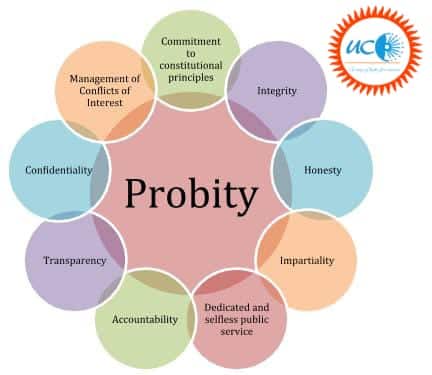What do you understand by probity in governance? Based on your understanding of the term, suggest measures for ensuring probity in government.
Approach
- Describe in brief about Probity.
- Discuss its role in governance.
- Suggest some measures to ensure probity in government.
- Conclude accordingly.
Answer:
Introduction
The term probity is derived from the Latin ‘probitas’, which means “honest.”
Probity in governance is the term used to describe the existence of strong ethical and moral norms inside the governance process. Honesty, accountability, integrity, compassion, and other positive traits make for excellent governance.
Body
Role of Probity in Governance:
- Probity preserves the public’s faith in government operations.
- Integrity in public services is maintained by probity.
- Probity encourages government accountability.
- Probity guarantees that protocols are followed.
- It seeks to avoid the potential for misconduct, fraud and corruption.
Measures to ensure Probity in Government:
- Accountability: The likelihood of governance misconduct is decreased through accountability. A person refrains from acting in a way that will diminish her status when she is required to respond to higher authorities.
- Moral education: To ensure the integrity of governance, moral education is essential. It is important to give someone ethical instruction that will motivate them to enhance governance if they want to become highly moral people. This will undoubtedly happen as a result of moral instruction.
- Grievance redressal: For the public to effectively file complaints, government officials must be easily accessible. It can be made sure of by:
- Senior employees’ phone numbers are accessible to the public,
- Citizen centric information on department websites,
- Citizens’ convenience counters,
- Monitoring and Evaluation.
- Code of conduct: Probity is preserved through developing and implementing code of behavior for ministers, bureaucracies, courts, and civil society organizations.
- Other Measures:
- Lok Pal: It perform the function of an “ombudsman” and inquire into allegations of corruption against certain public functionaries and for related matters.
- Strengthening of the Criminal Judicial System.
- Sense of Discipline: It is instilled by head of organizations and leaders of society. For E.g., Lal Bahadur Shastri paid when his sons used the official car.
- Behavioral change in bureaucrats through training, performance appraisal, inculcation of values like empathy and compassion.
- E-Governance: By using ICT for transparency. Further, it would also help in anonymous complaint against public servants by ordinary people.
Conclusion
Therefore, a combination of appropriate rules and regulations would lead to the development of supportive administrative procedures, and the enhancement of ethical competence is required to guarantee probity in governance. Further, reliance on external systems should be avoided since it increases the risk of a breach. Instead, the goal should be to develop strong, moral individuals who can preserve such principles on their own.





